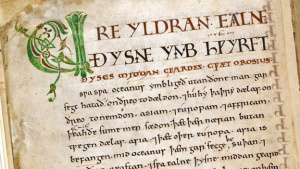Language/Old-english-ca-450-1100/Vocabulary/Education
Hi Old English (ca. 450-1100) learners! 😊
In this lesson, we will focus on Old English vocabulary related to education. We will learn some interesting facts about education in England during the Old English period, and we will practice our vocabulary through dialogues and examples. Don't forget to check out the vocabulary list at the end of the lesson.
Education in Old English England[edit | edit source]
Education in England during the Old English period was mainly focused on the teaching of the Latin language to the elite of society, which included the clergy, nobility, and some wealthy commoners. Latin was considered the language of education, science, and religion, and it was taught in schools called "monasteries" or "cathedrals". The curriculum included not only Latin grammar and writing but also arithmetic, astronomy, and music.
Most people, however, did not have access to formal education and were taught to read and write at home by their parents or tutors. The literacy rate was very low, estimated at less than 1% of the population. Therefore, most communication was oral.
Dialogues[edit | edit source]
Let's practice our Old English education vocabulary in context:
Dialogue 1[edit | edit source]
- Person 1: Hi, hwæt dydest ðu þisne morgen? (Hi, what did you do this morning?)
- Person 2: Ic fór tó læran ða bóc. (I went to learn the book.)
- Person 1: Hwæt læran ðu? (What are you learning?)
- Person 2: Ic lære Latin. (I am learning Latin.)
Dialogue 2[edit | edit source]
- Person 1: Hwæt is þæt? (What is that?)
- Person 2: Þæt is cniht. (That is a boy.)
- Person 1: Hwæt dóð cnihtas? (What do boys do?)
- Person 2: Cnihtas lærað. (Boys learn.)
Dialogue 3[edit | edit source]
- Person 1: Hwæt wære ðín magister? (Who was your teacher?)
- Person 2: Þæt wæs se abbod. (That was the abbot.)
- Person 1: Hwæt lærende hé? (What was he teaching?)
- Person 2: Hé lærode on Godes þeowte. (He taught in God's service.)
Vocabulary[edit | edit source]
Here are some common Old English education-related words and phrases:
| Old English (ca. 450-1100) | Pronunciation | English Translation |
|---|---|---|
| bóc | /boːk/ | book |
| læran | /ˈlæɑː.rɑn/ | to learn |
| stúdent | /ˈstuː.den.t/ | student |
| discípul | /dɪˈsɪ.pul/ | pupil |
| magister | /ˈmɑ.ɣis.ter/ | teacher |
| monasterie | /məˈnæs.tə.rɪ/ | monastery |
| cyrcan | /ˈkyr.kan/ | church |
| bóclícetung | /boːk.ˈliː.ce.tunɡ/ | literacy |
| grammátic | /ˈɡræm.mæ.tik/ | grammar |
| clæne sprǽce | /ˈklæ.nɛ ˈspræ.ce/ | eloquence |
| leornung-hús | /leor.nunɣ ˈhuːs/ | school |
Sources[edit | edit source]
➡ If you have any questions, please ask them in the comments section below.
➡ Feel free to edit this wiki page if you think it can be improved. 😎
Other Lessons[edit | edit source]
- Express Surprise
- Fruits
- Animals
- Colors
- Health
- Drinks
- Feelings and Emotions
- Geography
- Days of the Week
- Food

